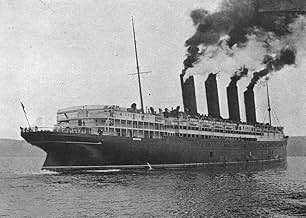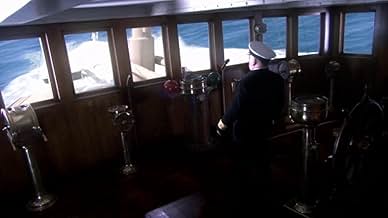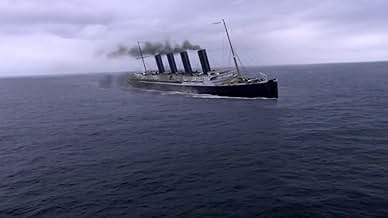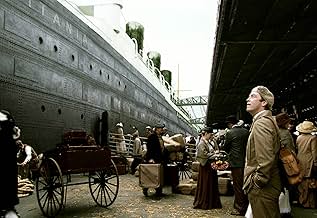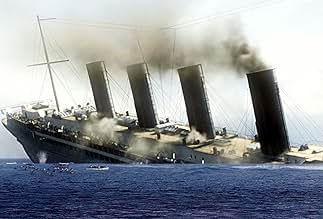A dramatization of the notorious World War I torpedoing of the ocean liner, RMS Lusitania.A dramatization of the notorious World War I torpedoing of the ocean liner, RMS Lusitania.A dramatization of the notorious World War I torpedoing of the ocean liner, RMS Lusitania.
- Director
- Writers
- Stars
Florian Panzner
- Lt. Capt. Schwieger
- (as Florian Panzer)
Madeleine Garrood
- Avis Dolphin
- (as Maddeleine Garrood)
Andre Weideman
- Johnston
- (as Andre Weiderman)
Stephen Jennings
- Carson
- (as Steven Jennings)
Robyn LeAnn Scott
- Peggy
- (as Robyn Scott)
- Director
- Writers
- All cast & crew
- Production, box office & more at IMDbPro
Featured reviews
The movie was okay and the cast did a wonderful job delivering the emotional impact the movie should have. What also worked was the actual footage at the end. What was horrible was depicting Winston Churchill and the British hierarchy as actually evil. That was unnecessary and pure nonsense.
I saw the docudrama today, thanks to Youtube, and can't support the criticism of the two other reviews here at all. Imho this BBC movie is a very good effort at educating the public about this crucial episode of history, regarding the constraints of the budget and the running time of the movie.
As a German citizen, I am, of course, not a totally impartial party (even though I try hard to be), but neither are British nor American commenters. However, I have read one of the most comprehensively sourced books on the subject, Colin Simpson's "The Lusitania", as well as countless in formations on the Internet and I'm basing my judgment on the facts that historians agree on, something that is lacking from both other reviews. And, as I see it, this BBC film got the most important facts right, while at the same time offering great acting and a storyline that shows the human side of the tragedy.
To the facts: - The Lusitania transported ammunition for the British war efforts, and this has been proved with documentary evidence. The movie mentions the fact, without going into the length of telling us that not only British officials knew this, but also US ones, as well as the German intelligence service. Since the complex US and German subplot would have taken a lot of time to tell (and introduce a lot of additional players), it is understandable that the movie leaves this side out. However, personally, I would have liked that a least a mention of the overwhelmingly pro-British tendency of the Wilson administration (especially the role of Col. House) would have been made, but it may have made the storyline too confusing.
Only the most important facts, and imho they are covered in a fair and still entertaining way by the movie. It would have been impossible to show every detail in a 90 minute feature, but the viewers get a good summary, which stay close to the view of the historians. And there isn't an especially pro-German bias (hey, it's a BBC production!). The hypocritical stance of the German Kaiser and his Admirals, who didn't want to be remembered of their own orders after public opinion turned against them is exposed, and German sub captain Schwieger is shown as a somewhat weak character, drawn between ambition, orders, and what may still have been left of ethical values. If there's any bias at all it's pro-American, because US officials, who put their countrymen into danger by deliberately ignoring the illegal transport of war supplies on a British passenger ship, aren't given any scrutiny at all. But, OK, this sideline would have taken another 20 minutes or so to tell.
So, all in all, a very good docudrama combining historical facts with good storytelling an cinematographic values. The special effects, the appearance of the Lusitania and the sub, don't look too cheap (which is often the problem with docudramas), also the use of historical coverage is accomplished in a convincing way. Taking also in consideration the good acting, especially the performances of John Hannah ("Four Weddings And A Funeral") and Adrian Topol, this movie deserves 8-9 out of 10 points. Job well done, BBC!
As a German citizen, I am, of course, not a totally impartial party (even though I try hard to be), but neither are British nor American commenters. However, I have read one of the most comprehensively sourced books on the subject, Colin Simpson's "The Lusitania", as well as countless in formations on the Internet and I'm basing my judgment on the facts that historians agree on, something that is lacking from both other reviews. And, as I see it, this BBC film got the most important facts right, while at the same time offering great acting and a storyline that shows the human side of the tragedy.
To the facts: - The Lusitania transported ammunition for the British war efforts, and this has been proved with documentary evidence. The movie mentions the fact, without going into the length of telling us that not only British officials knew this, but also US ones, as well as the German intelligence service. Since the complex US and German subplot would have taken a lot of time to tell (and introduce a lot of additional players), it is understandable that the movie leaves this side out. However, personally, I would have liked that a least a mention of the overwhelmingly pro-British tendency of the Wilson administration (especially the role of Col. House) would have been made, but it may have made the storyline too confusing.
- Not only ammunition, but also military personnel on the way to the war zone was transported. The movie doesn't show this, probably because it would have necessitated to introduce additional characters.
- As the movie mentions, the Lusitania was indeed on the list of British auxiliary cruisers. What the filmmakers doesn't tell us is that even basements for naval guns had been installed on the Lusitania after the war. Among passengers and staff, there were even rumours and that the guns were already hidden on the ship. Also mentioned by the BBC, contrary to agreed rules of naval warfare, Admiralty had issued orders to the merchant marine calling for deliberately ramming of submarines.
- It's a fact that British officials deliberately asked how the US would react if American citizen would be killed on a British ship. This is shown in the movie, even though it is left to the judgment of the viewers if and how this influenced the Admiralty in their decisions. The movie just shows the known facts, without taking a clear stance, which is a good idea regarding the lack of decisive evidence.
- The Germans had declared the waters an unrestricted war zone, and really warned passengers in the newspapers. The Lusitania, as a well known British ship, was in imminent danger, while at the same time neutrals, like American vessels, would have been relatively safe. Like the movie showed, it was dangerous ignorance in combination with misguided believe in the Admiralty safety promises that led many passengers to ignore the grave risk.
- The movie shows only one torpedo being fired. This is in accordance with German documents and testimonies, and the established view of historians worldwide. There has never been compelling evidence that more torpedoes were fired. The question, why the Lusitania sank so fast has never really been answered, the most recent view being that both the specific construction of the Ship (longitudinal bulkheads!) and an explosion of a boiler played a role. The movie doesn't show how the second explosion happened and so stays neutral on this question. Imho a good idea, because this isn't essential to the story.
- The Admiralty really did take an unfair stance in the court case, as depicted in the movie. Also, the order for the so called "advised course" contradicted other standing orders, as well as the necessities of navigation. And many important information were never relayed to the Lusitania. What isn't shown is that the Admiralty even presented doctored wireless logs, and that the judge noticed that. Maybe it would have been good to include this in the story, since it adds to the understanding of the administration-critical stance of the Judge, and of the consequent verdict.
Only the most important facts, and imho they are covered in a fair and still entertaining way by the movie. It would have been impossible to show every detail in a 90 minute feature, but the viewers get a good summary, which stay close to the view of the historians. And there isn't an especially pro-German bias (hey, it's a BBC production!). The hypocritical stance of the German Kaiser and his Admirals, who didn't want to be remembered of their own orders after public opinion turned against them is exposed, and German sub captain Schwieger is shown as a somewhat weak character, drawn between ambition, orders, and what may still have been left of ethical values. If there's any bias at all it's pro-American, because US officials, who put their countrymen into danger by deliberately ignoring the illegal transport of war supplies on a British passenger ship, aren't given any scrutiny at all. But, OK, this sideline would have taken another 20 minutes or so to tell.
So, all in all, a very good docudrama combining historical facts with good storytelling an cinematographic values. The special effects, the appearance of the Lusitania and the sub, don't look too cheap (which is often the problem with docudramas), also the use of historical coverage is accomplished in a convincing way. Taking also in consideration the good acting, especially the performances of John Hannah ("Four Weddings And A Funeral") and Adrian Topol, this movie deserves 8-9 out of 10 points. Job well done, BBC!
The Lusitania was a passenger ship of the Cunard Line, sunk by a German submarine in 1914 with a tremendous loss of life, 1200 crew and civilians of all ages, in the frigid waters of the north Atlantic. It was a big ship -- 800 feet long, about the size of a battleship -- and at 25 knots very fast for its time.
The German government had issued warnings that all British ships were in danger of being fired on because so many were transporting supplies and arms from the US to Britain. The US hadn't yet entered the war and the arms business was booming. But almost everyone, the Royal Navy included, scoffed at the warnings as hogwash.
When the ship is at sea, a scene took place that at first startled me. I was afraid the story would be completely derailed. We're all on the bridge, the captain (Kenneth Cranham) and number one are strutting around in their gold-emblazoned blue uniforms, and the humble helmsman pipes up with, "What course shall we be sailing when we enter submarine waters, captain?" I can't count the number of hours I spent at the helm of a US Coast Guard cutter, but if I or any other helmsman had been so impolitic as to ask a question like that, we'd have been drawn and quartered like William Wallace. Fortunately, the captain at once establishes a return to reality. "And what business is that of yours?", he snaps, shutting the cheeky helmsman up.
The story is carried by the narration of a Scots professor (John Hannah),one of the few survivors. The German U-boat crew is dealt with at some length, and portrayed more as ordinary humans rather than ravening beasts. In the more simple-minded films you can often tell at a glance what view of the enemy will be taken. How mean are they to one another and, especially, how ugly are they? An exception must be made for the brains behind the beef. The leader is often charming, suave, cultivated and fond of good wine and classical music.
The film is far harder on Alfred Vanderbilt (Kevin Otto), a handsome young scion of an American family that built its fortune in the fur trade. He's arrogant and sly. Sounds like a character in the unfortunate "Titanic," as it should. The stories and characters are isomorphic, except that instead of two doomed lovers we have the Scots professor and a young girl and neither of them drowns.
There's also a kind of epilogue. The German U-boat commander, who hesitates briefly before sinking the ship with a single torpedo, is not hailed as a hero back home because it's a propaganda victory for the Allies. He's lucky to keep his rank. The British seize on the event and promote it as evidence of the Hun's barbarity, claiming there were as many as three torpedoes, and using the incident to round up more enlistees. It also influenced America's entry into the war. The US hated all things German after the Lusitania. Sauerkraut became "liberty cabbage" (cf., "freedom fries"), and prohibition was enacted in 1919, which shut down all the breweries like Anheuser-Busch, Blatz, Schlitz, Reingold,and Budweiser.
The acting and direction are competent, although the young girl isn't much of an actress yet. The CGIs are primitive but acceptable for a TV movie. It's really a kind of history lesson, and not a bad one for today's youth.
The German government had issued warnings that all British ships were in danger of being fired on because so many were transporting supplies and arms from the US to Britain. The US hadn't yet entered the war and the arms business was booming. But almost everyone, the Royal Navy included, scoffed at the warnings as hogwash.
When the ship is at sea, a scene took place that at first startled me. I was afraid the story would be completely derailed. We're all on the bridge, the captain (Kenneth Cranham) and number one are strutting around in their gold-emblazoned blue uniforms, and the humble helmsman pipes up with, "What course shall we be sailing when we enter submarine waters, captain?" I can't count the number of hours I spent at the helm of a US Coast Guard cutter, but if I or any other helmsman had been so impolitic as to ask a question like that, we'd have been drawn and quartered like William Wallace. Fortunately, the captain at once establishes a return to reality. "And what business is that of yours?", he snaps, shutting the cheeky helmsman up.
The story is carried by the narration of a Scots professor (John Hannah),one of the few survivors. The German U-boat crew is dealt with at some length, and portrayed more as ordinary humans rather than ravening beasts. In the more simple-minded films you can often tell at a glance what view of the enemy will be taken. How mean are they to one another and, especially, how ugly are they? An exception must be made for the brains behind the beef. The leader is often charming, suave, cultivated and fond of good wine and classical music.
The film is far harder on Alfred Vanderbilt (Kevin Otto), a handsome young scion of an American family that built its fortune in the fur trade. He's arrogant and sly. Sounds like a character in the unfortunate "Titanic," as it should. The stories and characters are isomorphic, except that instead of two doomed lovers we have the Scots professor and a young girl and neither of them drowns.
There's also a kind of epilogue. The German U-boat commander, who hesitates briefly before sinking the ship with a single torpedo, is not hailed as a hero back home because it's a propaganda victory for the Allies. He's lucky to keep his rank. The British seize on the event and promote it as evidence of the Hun's barbarity, claiming there were as many as three torpedoes, and using the incident to round up more enlistees. It also influenced America's entry into the war. The US hated all things German after the Lusitania. Sauerkraut became "liberty cabbage" (cf., "freedom fries"), and prohibition was enacted in 1919, which shut down all the breweries like Anheuser-Busch, Blatz, Schlitz, Reingold,and Budweiser.
The acting and direction are competent, although the young girl isn't much of an actress yet. The CGIs are primitive but acceptable for a TV movie. It's really a kind of history lesson, and not a bad one for today's youth.
People always talk about Titanic this Titanic that, it was an accident waiting to happen. People died yes on that ship where it could have been averted. The Lusitania however, was the beginning and the end for the Germans and eventually lose World War One. The sinking of the ship was a barbaric act and no doubt a sad ending for those who died. Unlike the Titanic where there wasn't enough lifeboats, Lusitania had all the safety feature that was built into after Titanic like double hull and more then enough lifeboat for the passenger, but wasn't build to stop a torpedo.
The movie itself was really good. I'm surprise that guy from Mummy was in the movie and instead of being a comic relief, gave a very serious acting in the movie where he was a victim on the ship. The other people in the movie also showed the same and for a quality we expected in a docu-drama movie, the movie more the met my expectation. The sinking was very well done and was more sad then Titanic. Thank goodness there is none of this Jack and Rose crap in it.
Otherwise, a very well made movie and one that should be a reminder about how Lusitania became a pawn in the World War.
The movie itself was really good. I'm surprise that guy from Mummy was in the movie and instead of being a comic relief, gave a very serious acting in the movie where he was a victim on the ship. The other people in the movie also showed the same and for a quality we expected in a docu-drama movie, the movie more the met my expectation. The sinking was very well done and was more sad then Titanic. Thank goodness there is none of this Jack and Rose crap in it.
Otherwise, a very well made movie and one that should be a reminder about how Lusitania became a pawn in the World War.
If you want the best info on it read the book Dead Wake. excellent in the details. makes you think you where on it with the detail info on passengers. used the war diary from the german sub commander and he reviewed the books and pics from the sinking. he obtained some very recent info from the British secret service who knew where the sub was but didint tell the ship. a sad bunch of unfortunate circumstances.
Did you know
- TriviaThe U-20 set was the original U-96 set used in Le Bateau (1981). The Type U-19 of World War I and Type VIIC of World War II had similar internal dimensions. The Lusitania scenes were filmed with full-scale sections of the ship off the coast of South Africa while the U-20 scenes were filmed at Bavaria Studios in Munich using the then-newly refurbished 25-year-old U-boat set, studio model and full-size prop originally built for the West German war film Das Boot (1981).
- GoofsOn at least two occasions the captain of the U 20 gives the order to "blow ballast" when he wants to dive the submarine. This order would result in all water being blown out of the ballast tanks and should only be given to surface the boat. In order to dive a submarine one must flood the ballast tanks with water.
- Quotes
Captain Turner: They're not interested in the truth.
- Crazy creditsAdrian Topol's character name is pronounced Voegele in the German dialogue and is spelled this way in the accompanying English subtitles. However in the credits it is spelled Vogele. Correct German spelling uses either "ö" (o with an umlaut) or else "oe".
- ConnectionsFeatured in Titanic al detalle (2013)
Details
- Release date
- Countries of origin
- Languages
- Also known as
- Sinking of the Lusitania: Terror at Sea
- Production companies
- See more company credits at IMDbPro
Contribute to this page
Suggest an edit or add missing content

